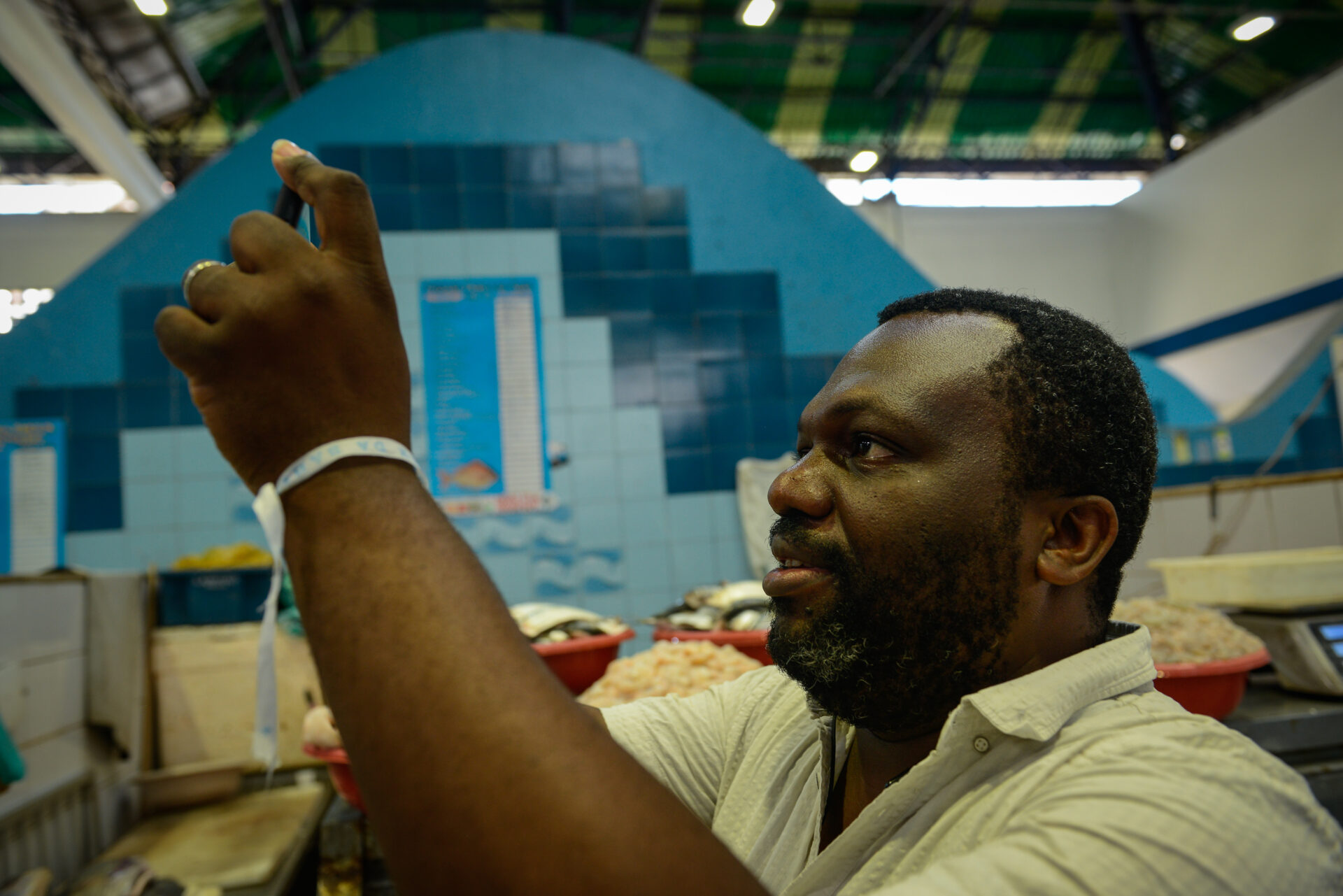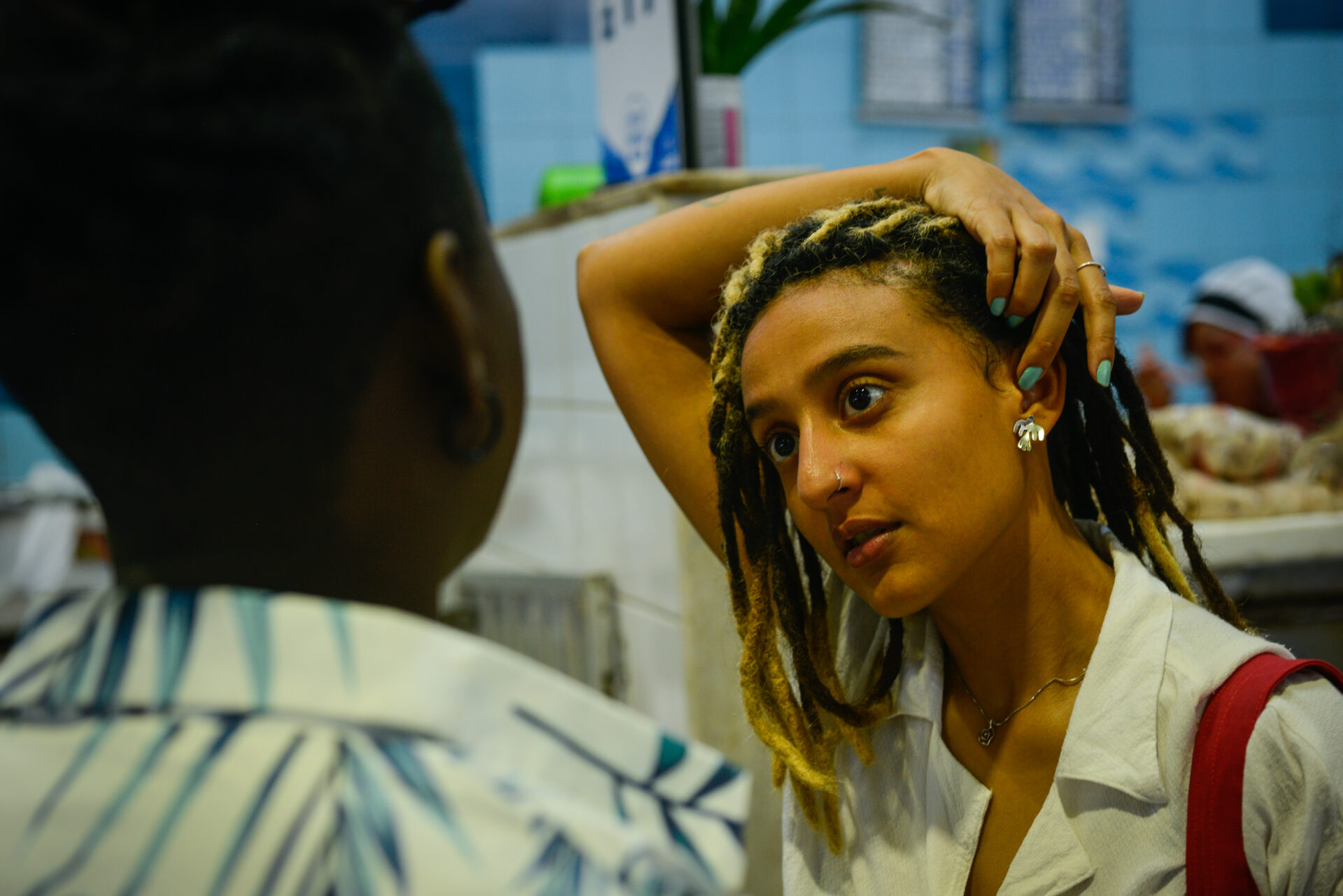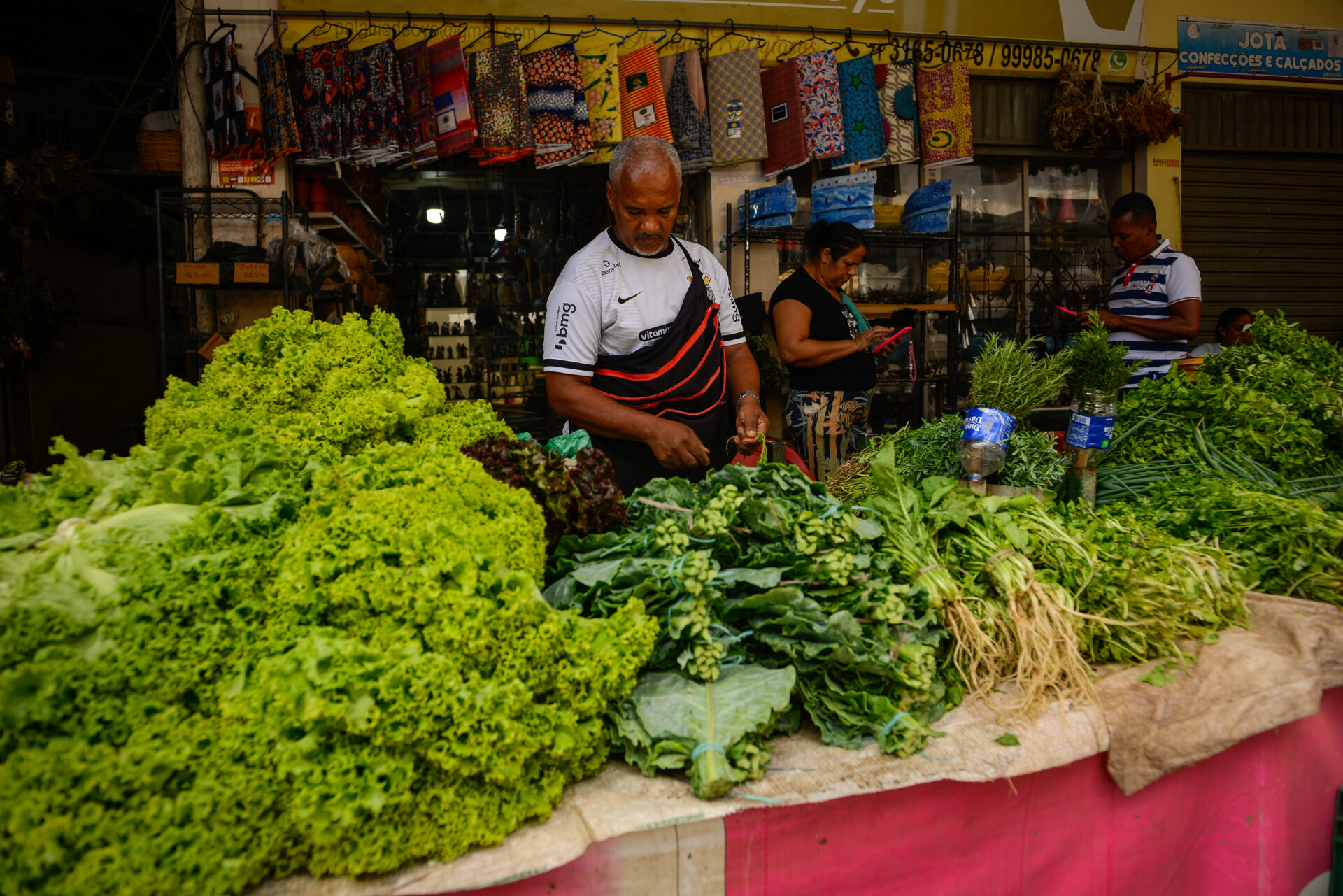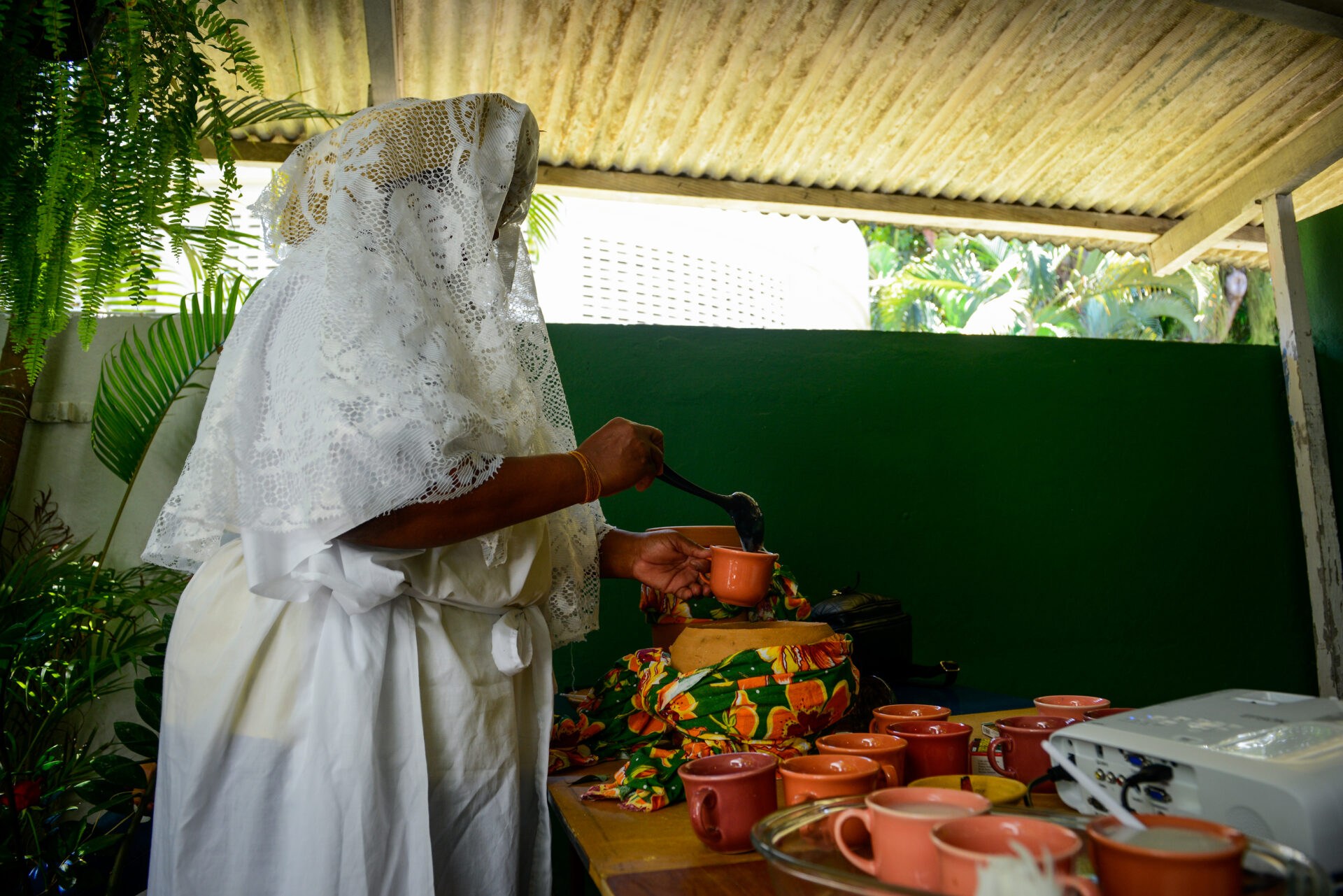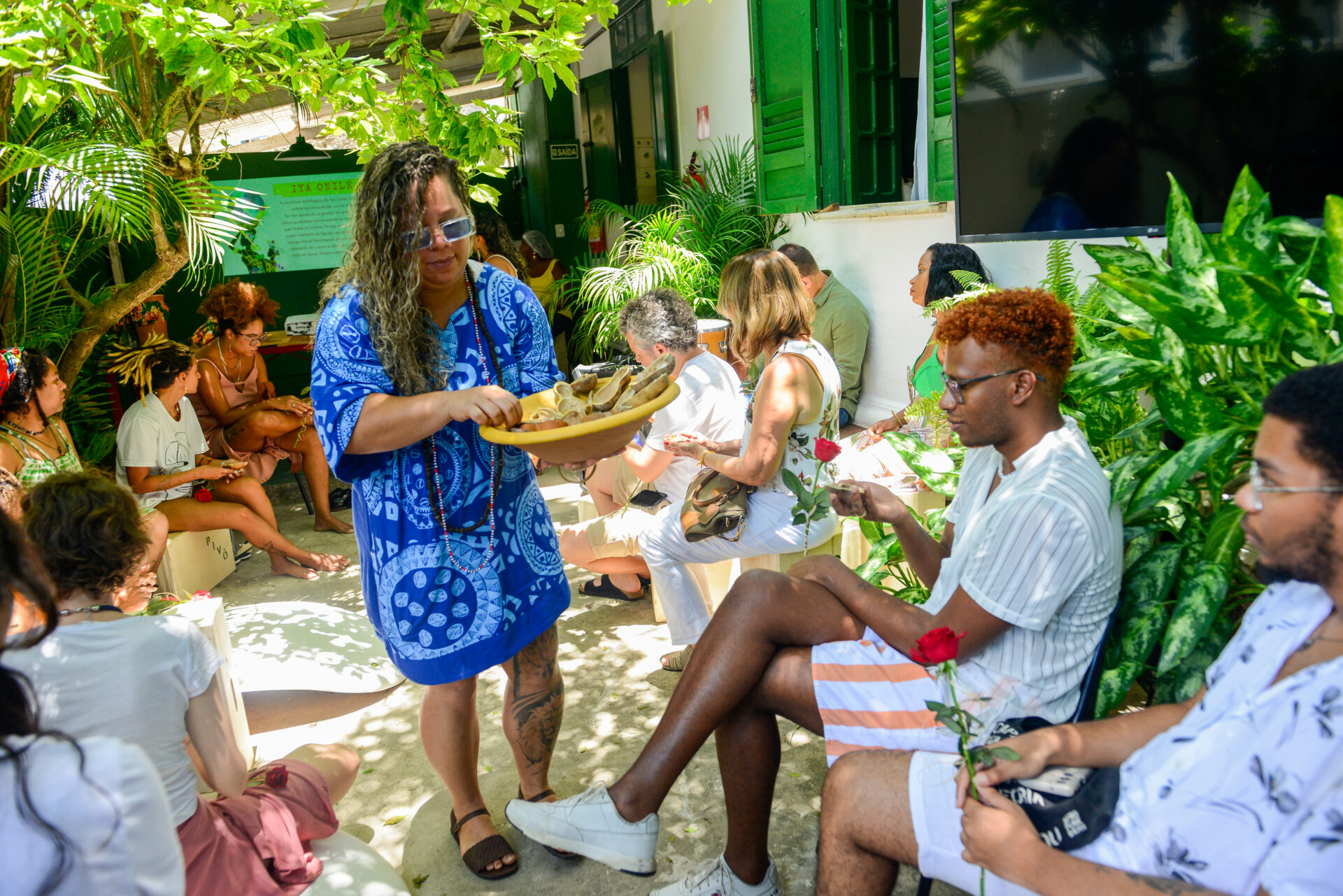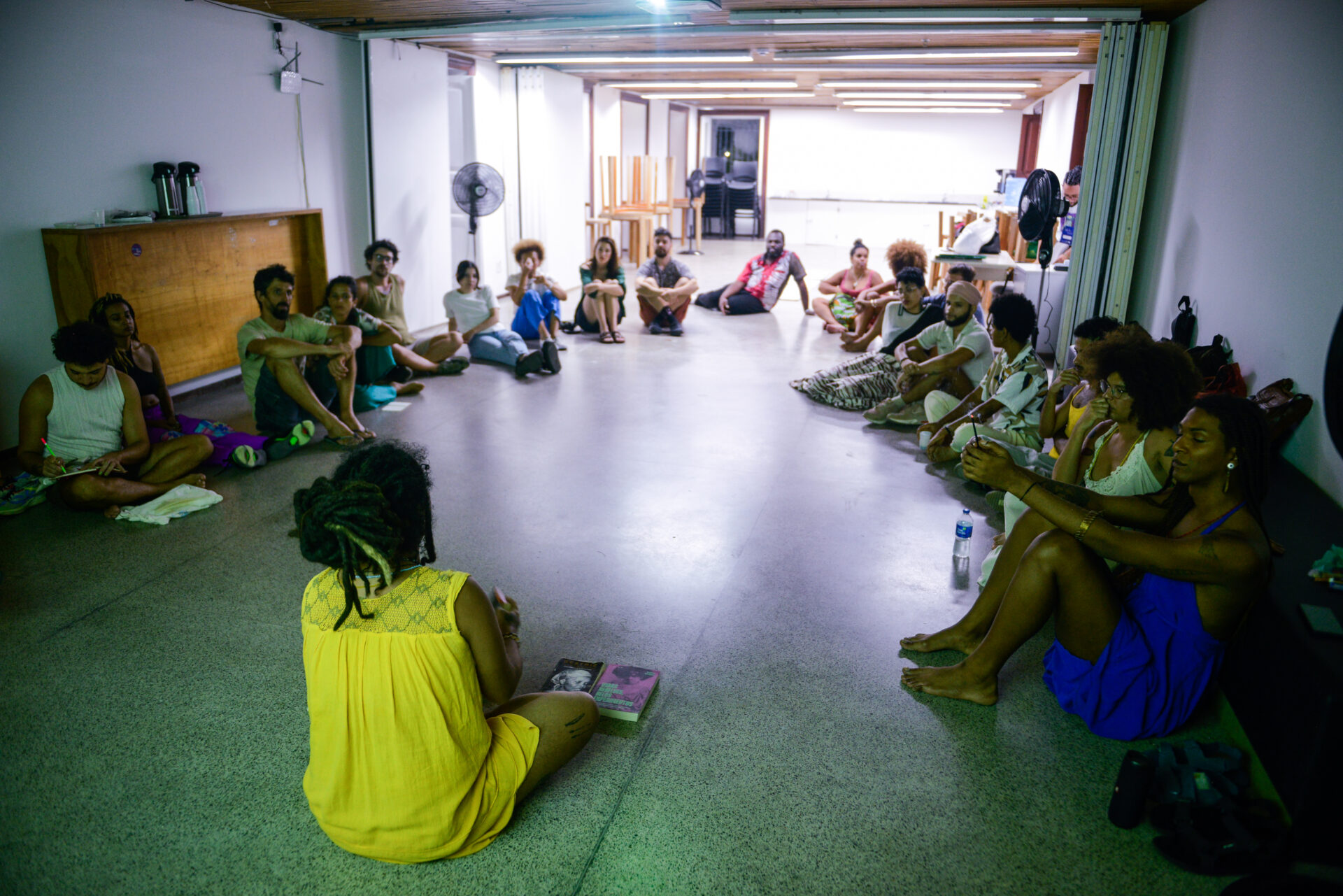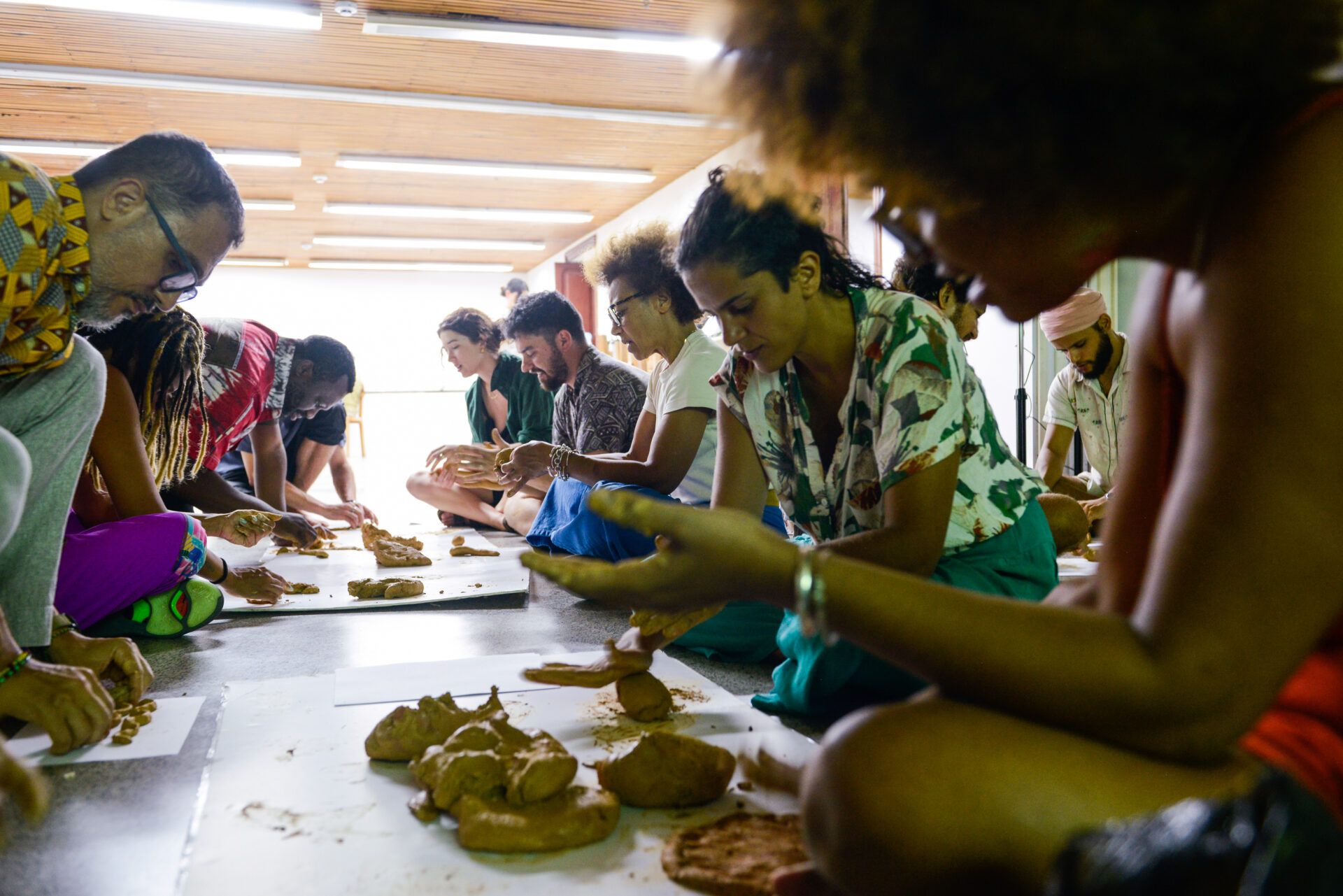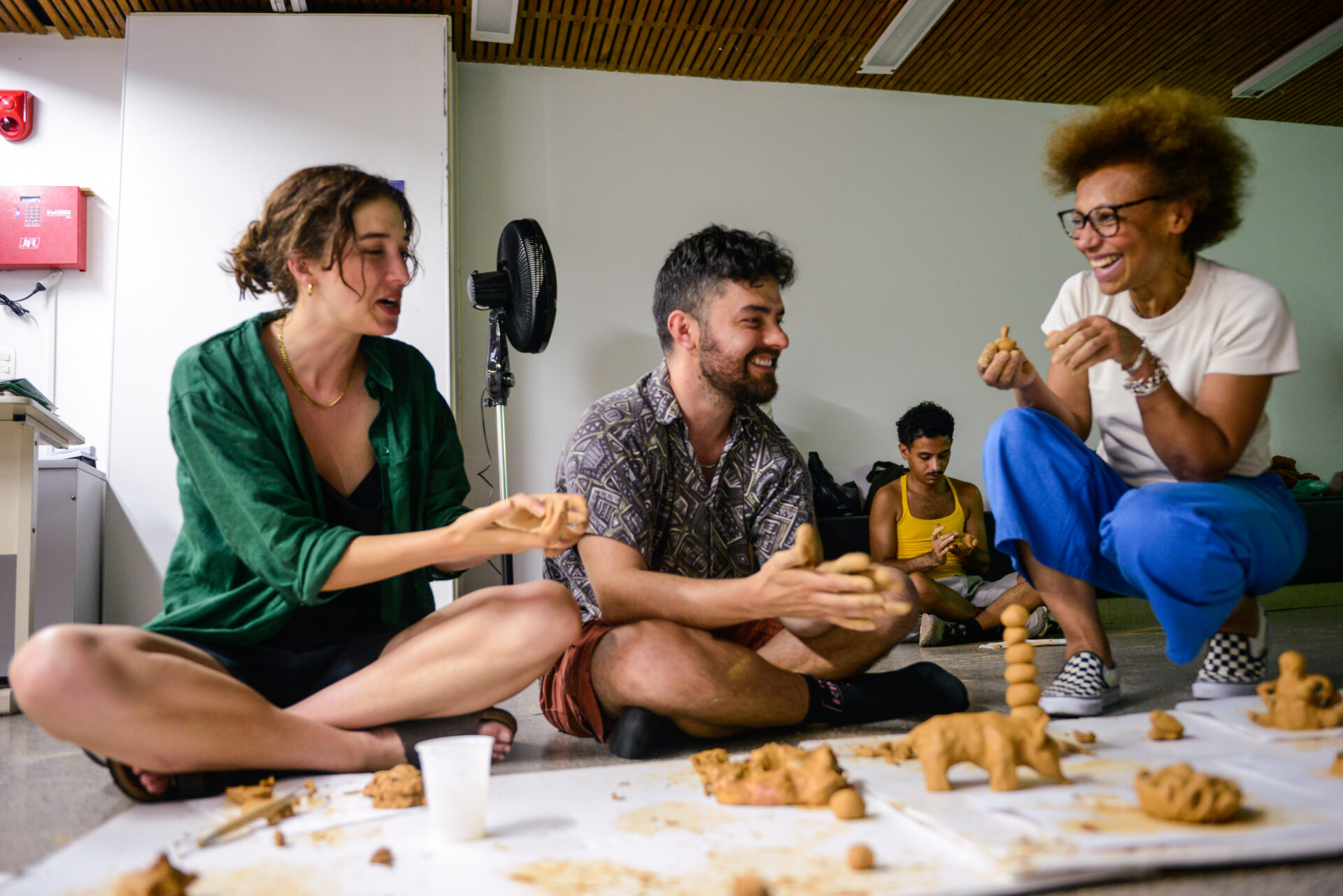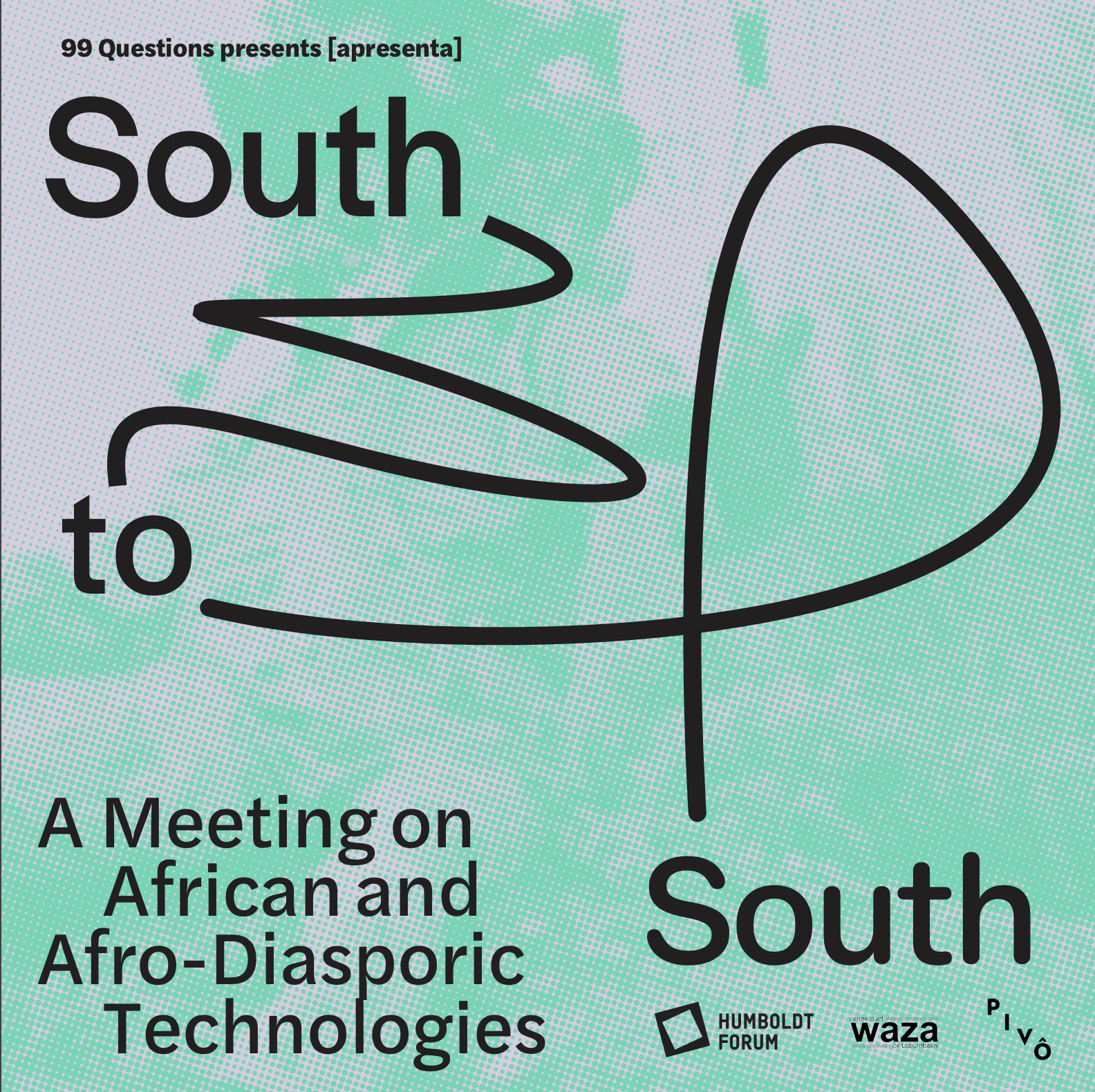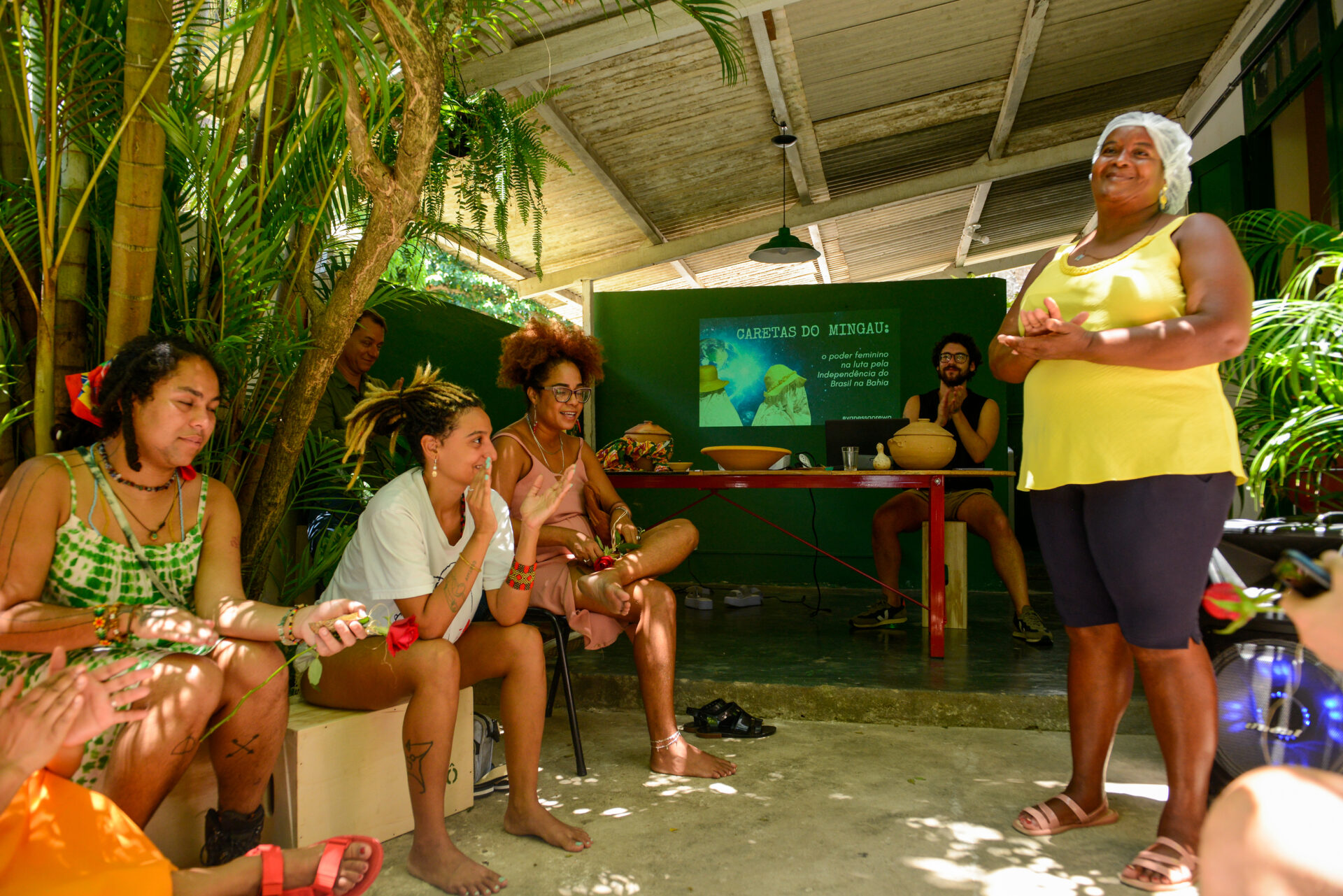
The event South-to-South: A Meeting on African and Afro-diasporic Technologies, taking place from November 24 to December 1 at Pivô Salvador and partner institutions in the city, will gather a small group of artists, thinkers, and community organizers. The goal is to think and share different branches of technology, art, and local cosmologies. The meeting is dedicated to understanding how African cosmologies and the recovery of ancient practices linked to the earth are crucial for developing alternative definitions of technology. As part of the “99 Questions” series at the Humboldt Forum in Berlin, curated by Michael Dieminger, the art historian Sara Garzón is invited to collaborate with Pivô in Brazil and the Centre d’art Waza in Lubumbashi in organizing this program.
During the meeting, guests will offer lectures, tours, and cooking sessions to outline specific approaches to technological thinking and its relationship with situated knowledge. The goal is to share knowledge beyond transnational borders and enrich perspectives from various agents of the global south.
The transdisciplinary research program rehearses the “Manifesto of Modern Maroonism” by Martinican artist René Louise. Published in 1991, this manifesto proposed building a decolonial future based on resistance and denial of colonial and Western modes of existence, reclaiming ideas of technological thinking that highlight forms of coexistence and resilience. For Louise, one such idea was Maroonism, which was not only an anticolonial challenge practice but also an aesthetic project that could transform both “everyday life and the future.” In Louise’s thought, maroonism as a modern technology could take the form of robotics, cybernetics, or biotechnology, in a way that would recover the “achievements and traditions of our ancestors.” With this provocation, the program will focus on joining forces with other creators and institutions seeking to pluralize technology definitions, recognizing local knowledge production systems.
In 2023, the group will be hosted by Pivô’s new artist residence in Salvador. In 2024, the group will reconvene at the Centre d’art Waza in Lubumbashi to continue technological provocations, this time with the historical and territorial context of the Democratic Republic of Congo in mind.
In addition to the meeting, the initiative offers scholarships for two resident artists and a podcast moderated by Dr. Constanza Salazar. The two resident artists, Sarah Ndele (Congo) and Elsa M’Bala (Cameroon), were selected by the organizing institutions and will reside at Pivô Salvador.
The event features participation from: Michael Dieminger (99 Question/Humboldt Forum), Sara Garzón (South-to-South: A Meeting on African and Afro-diasporic Technologies), Ana Roman and Mônica Hoff (Pivô), Christian Nyampeta, Patrick Mudekereza (Centre d’art Waza), Ouilimata Gueye,Lo-Def Film Factory, Gabriela de Matos, Walla Capelobo, Vanessa Orewá Pereira, Elsa M’Bala, biarritzzz, Buhlebzewe Siwani, Sara Ndele, Anne Rodrigues, Museu de Arte Contemporânea da Bahia, Acervo da Laje, and Casa do Benin.
The program includes a variety of events such as conversations, workshops, and performances, focusing on topics like technological thinking, maroonism, cultural archives, and the intersection of technology and art in the context of African and Afro-diasporic cultures.
Schedule
11/25 (SATURDAY)
Location: Pivô Salvador
10 AM – 1 PM – Sowing Words, with Vanessa Orewá Pereira
Vanessa Orewá names this moment as “sowing words.” The story she narrates addresses the history of the Recôncavo Baiano (RB), a place known for producing knowledge, practices, feelings, and technologies. She will present the history of the Caretas do Mingau and explore how technologies can be understood through the bodies of indigenous women. There will also be the preparation and sharing of porridge. For this, Vanessa collaborates with the coordinator of the Caretas do Mingau group, the elder Guiomar.
Maximum Capacity: 20 people
11/26 (SUNDAY)
Location: Pivô Salvador
5 PM – Meme Pedagogy, with biaritzzzz
Overcoming a history of violence, silencing, and erasure implies the continuous creation of new ways of seeing, feeling, and existing. Since 2016, Biaritzzzz has developed Meme Pedagogy, a research and practice involving the observation of relationships between low fidelity and quality images, created by marginalized bodies, minds, and sexualities in the north and northeast of Brazil. These independent and digital visual discourses gain prominence in Brazilian culture, radically decentralizing the predominantly white hegemonic figures. This decentralization creates distinct scenarios where gender and sexually dissident figures, as well as racialized ones, emerge as spokespeople in internet communities. By becoming their own storytellers, these people disseminate knowledge through humor and the use of unconventional equipment, software, and narratives, subverting the existing technocratic regime and its political dynamics.
Maximum Capacity: 30 people
11/27 (MONDAY)
Threads of Time: Weaving Ancestry and Diaspora in Afro-Brazilian Architecture – Gabriela de Matos
In this conference, we will address Afro-Brazilian architecture from an ancestral perspective while also highlighting its unique contribution to the field of contemporary architecture. The presentation will unveil the layers of connection between Afro-Brazilian architectural practices and their African roots, emphasizing the cultural hybridism that arises from interaction with the native cultures of Brazilian territory. We will explore Brazil as a space of ancestral and diasporic confluence, where Afro-Brazilian and indigenous architecture stands out for its relationship with the land, translated in its form of expression through materials, shapes, sustainable construction methods, and space occupation. The discussion will include how these practices can provide valuable insights for addressing contemporary and future environmental issues, proposing an alternative paradigm of interaction with our ecosystem. The conference will also examine the notion of time embedded in the adinkra Sankofa, which symbolizes the importance of reflecting on the past to build the future. This philosophy resonates in the pioneering initiatives of Afro-Brazilian architecture, which seeks to harmonize the lessons of the past with innovations for sustainable development. Through critical analysis, we will reveal how Afro-Brazilian architecture can contribute to a broader discourse on design, sustainability, and cultural identity, pointing towards a future where respect for nature and cultural heritage are fundamental in creating livable spaces.
11/28 (TUESDAY)
Location: Museu de Arte Contemporânea da Bahia
7 PM – Lecture: What Matters are the Stories We Tell to Narrate Other Stories of the Future, with Oulimata Gueye
Synopsis: Oulimata Gueye’s lecture addresses the importance of the stories we tell to shape other narratives about the future. Her research focus is on the “Future” as a historical construction that implies knowledge and power relations, especially regarding Africa’s role in this construction. Gueye seeks to revisit the past to understand the impact of colonization on future visions developed in the West and how these concepts persist today.
As part of a curatorial approach to this research, she presents the work of researchers, artists, and architects who critically look at history and imagine alternative scenarios for the future of the African continent. The presentation is based on the exhibition “UFA, Université des Futurs Africains” (University of African Futures), which Gueye organized at Le Lieu Unique in Nantes in 2021. The lecture is an opportunity for the public to reflect on historical narratives and their influences on contemporary visions of the future, especially in relation to Africa.
11/29 (WEDNESDAY)
Location: Pivô Salvador
9h30 – 12h: Lecture Patrick Mudekereza Director of Centre d’art Waza
Location: Museu de Arte Contemporânea da Bahia
6 PM – Workshop with Walla Capelobo + Joa Assumpção
Synopsis: Between ceramics, clay, and dance, change is present. The survival of the quilombola way of life is linked to the power of transformation according to their needs, their technologies to adapt to territories often inhospitable to our existence. How do we cultivate within ourselves the technologies that make us adapt and live in constant transformation in a world ordered by colonial control? What transformations are necessary to escape the era of extinction? With the desire to cultivate impermanence as a way of existence in mind, Walla Capelobo invites the artist, dancer, educator, and friend Joa Assumpcao to join us in the celebration and activation of quilombola movement wisdom in our bodies. The activity explores the wisdom of Exus and Pombas Gira (spiritual entities that teach about transformations), Xica Manicongo (considered the first Brazilian transvestite who lived in Salvador in the 17th century), and Orixá Nanã (the clay that made the world and us). The historical quilombo was the result of radical imagination to believe in freedom, now, what imaginative radicalities do we need to move us? It’s time to experience in our bodies the possibilities that are given to us today as impossible. That’s why connecting with ancient energies can be an important alternative to drive our imaginations in a world of constant destruction.
Maximum Capacity: 20 people
11/30 (THURSDAY)
Location: Ilha de Itaparica
11 AM – KITALA TALALA (MIRROR), by Sarah Ndele
Performance
Sara Ndele will present a mask performance on Ilha de Itaparica. Her work, titled “KITALA TALALA,” is not a mirror in the traditional sense, but rather resembles a reflection in water. She explains that, in the past, ancestors used water as a mirror until the arrival of the colonizers. In Ndele’s performance, there is a valorization of masks, which are part of the cultural heritage often abandoned under the pretext of witchcraft.
Ndele believes it is possible to recover the lost connection with the ancestors by reclaiming belief in masks and respecting the legacy they left behind. She emphasizes that the masks and statues made by the ancestors are also a form of technology, as each one represents something significant in society. She highlights different masks and their roles, such as the KINKUNDI mask, used in Yombe initiation rituals, and NKISI NKONDI, which represented a judge. Other masks, like TAMTAM and LOKOLE, were used for communication, similar to a telephone, while SHITETELA, among the Shokué, was compared to an airplane with the mission of saving slaves. Ndele emphasizes that these masks not only acted as mediators between the physical and spiritual worlds but also played a crucial role in communication between the material and physical worlds.
12/1 (FRIDAY)
Location: Pivô Salvador
2 PM – Sound Workshop by Elsa M’Bala
Synopsis:
Cultural archive is a term associated with social anthropology. It refers to a set of knowledge found in daily interactions that individuals need to validate their existence in the world. Some use this term to preserve and celebrate specific societal rituals. Community work, on the other hand, signifies work that is not private or financial but for charity and educational purposes. For some, this term means working directly with individuals, conducting needs assessments, and making referrals to resources within the community. One of the greatest examples in this context on the African continent was Halim El Dabh. When working with cultural archives, especially those born in the context of colonialism, many sensitive topics arise, such as when to reuse an archive, from what perspective or gaze is one speaking? How is it possible to implement these archives today without removing their authority and subjectivity? And, more recently, in this globalized world, to whom do these archives belong?
Maximum Capacity: 30 people
The program is organized by art historian Sara Garzón, in collaboration with Pivô, and with the Centre d’art Waza in Lubumbashi, and is sponsored by the 99 Questions initiative of the Humboldt Forum.

 Português
Português